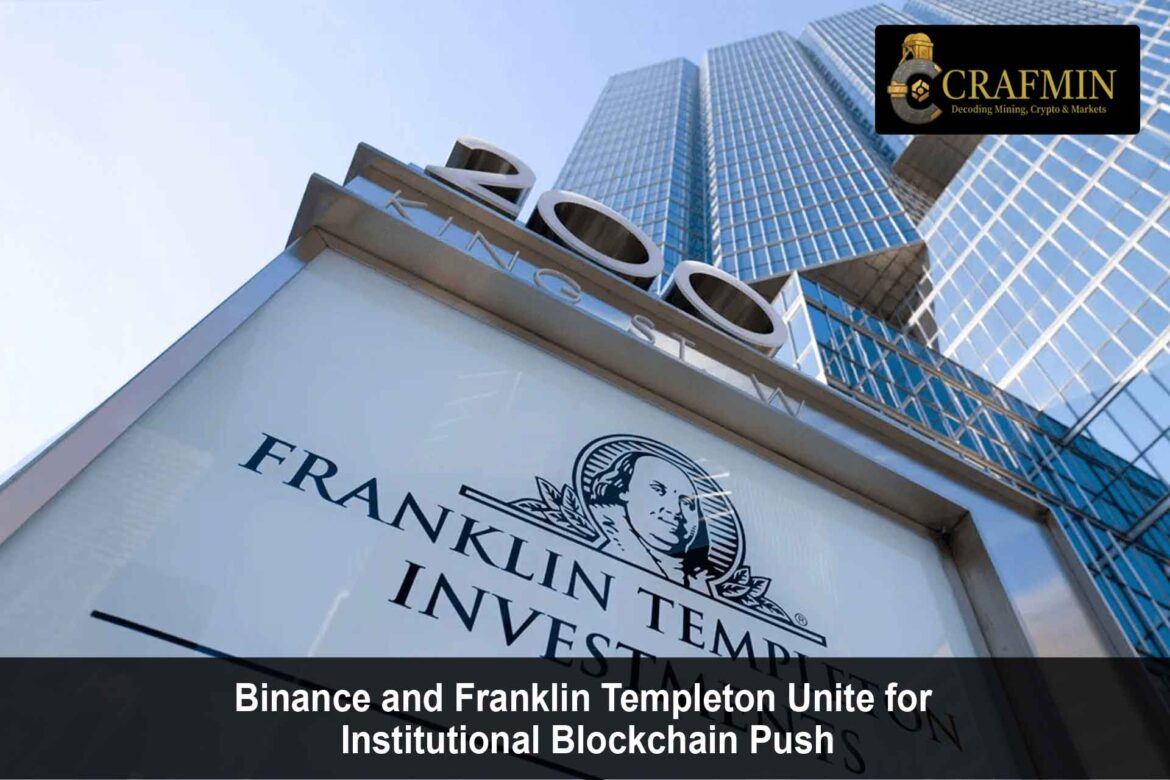Blockchain in traditional finance is no longer a theory. In September 2025, Binance and Franklin Templeton announced a partnership to launch tokenised securities and digital asset products for institutional investors.
Franklin Templeton, a global investment fund manager, oversees US$1.64 trillion (AU$2.48 trillion) in assets, bringing in that dimension of regulatory time lapse. Binance brings infrastructure, a massive user base, and liquidity across global digital markets.
Such a partnership intends to create safe platforms on which traditional securities can be efficiently aligned to blockchain. This will be a great milestone for digital asset adoption in 2025 by the Binance Franklin Templeton partnership.
This will target institutional investors who would want transparent, efficient, and scalable financial solutions. The move elevates the status of blockchain in traditional finance from merely an experimental phase.

Binance and Franklin Templeton partner to create institutional-grade digital asset products
How Will the Tokenised Securities Platform Work?
The heart of the collaboration is the creation of a tokenised securities platform. With this platform, bonds, funds, and structured products could be tokenised.
Tokenisation facilitates the quicker settlement of trades, reduces counterparty risk, and provides better portfolio construction for large institutional investors. Promoting compliance and scalability is the Benji technology platform of Franklin Templeton.
Binance will come into play with trading, custody, and global distribution services. It aims to establish a strong marketplace for tokenised assets.
Investors get visibility into holdings in real time, collateral management that is more streamlined, and reduced transaction costs. This marks the dawn of a world where securities are digital and not paper-based.
Why Does Blockchain in Traditional Finance Matter?
The conceptualisation of blockchain with regard to traditional finance is no longer seen as theoretical. It has practical benefits for investors, regulators, and financial institutions.
Settlement used to take days, and now it is merely minutes. Collateral can be designated with high precision, hence reducing systemic threats.
Transparency exists, giving way to ensure that regulatory frameworks grow tighter by the day. Institutional investors invariably seek greater efficiency and accountability.
It is here where blockchain emerges, amalgamating security with operational jet speed. The Binance-Franklin Templeton partnership in 2025 would showcase this transformation in a large-scale manner.

Benefits of Blockchain in Finance
What Challenges Could the Binance Franklin Templeton Partnership 2025 Face?
- Will regulators adapt quickly enough to tokenisation?
Digital assets must comply with laws across multiple jurisdictions, creating uncertainty. - Will institutions adopt tokenised products widely?
Investors need assurance that systems are secure, transparent, and liquid at scale. - Can the infrastructure handle global demand?
Cybersecurity, custodial risks, and interoperability remain major concerns for blockchain in traditional finance.
These questions will shape the partnership’s success and wider industry adoption.
How Will the Tokenized Securities Platform Work?
The partnership centres on a tokenised securities platform for bonds, funds, and structured products.
It promises faster settlement, lower risk, and smarter portfolio management.
Franklin Templeton ensures compliance through its Benji Platform, while Binance delivers global reach and custody.
Together, they aim to build a digital marketplace that is seamless, transparent, and cost-efficient.
Traditional Securities vs Tokenised Securities
| Feature | Traditional Securities | Tokenised Securities Platform (Binance & Franklin Templeton) |
| Settlement Speed | Takes 2–3 business days | Near real-time settlement |
| Transparency | Limited, requires intermediaries | Full visibility via blockchain ledger |
| Collateral Management | Manual, slower adjustments | Automated and efficient with smart contracts |
| Accessibility | Restricted to certain investors | Broader, scalable access (institutional focus initially) |
| Operational Costs | Higher due to intermediaries | Lower with streamlined blockchain infrastructure |
What Opportunities Lie Ahead?
Tokenisation furthers goal-oriented thinking towards Franklin Templeton’s longer-term vision on efficiency and investor access, while for Binance, the umbrella partnership is enshrined as a global bridge between digital and traditional finance. Together, they can release talismans over trillions of tokenised assets by the year 2030.
Markets are watching each step with baited breath for product launches at the end of 2025, likely tokenised bonds, money market funds, and customised institutional solutions. The partnership, if successful, can change the face of how global capital markets are born.
How Will This Impact Investors?
The institutional investors are those who shall be maximising the benefit. They could now buy new products with high liquidity and low operational costs. Retail investors may get exposure later on through regulated and adoption-simple offerings.
Investors seeking diversification may find tokenised products attractive. They offer the traditional financial security on the blockchain with efficiency. This partnership will also enhance the trust level for blockchain in traditional finance all over the globe.

Binance and Franklin Templeton tokenised products blend security with blockchain efficiency
Conclusion
The landmark moment of the 2025 Binance Franklin Templeton alliance. It combines global trading infrastructure and institutional asset management know-how.
A tokenised securities platform can be the next big thing for traditional finance to embrace blockchain. Still, there exist some challenges, but opportunities for investors and institutions abound.
This collaboration is a signal that blockchain is graduating from mere niche technology into mainstream financial infrastructure.
Also Read: ATO Shifts Rules on SMSF Crypto Valuation Compliance
FAQs
Q1: What is the ultimate aim of the Binance Franklin Templeton Partnership 2025?
The partnership aims to deliver institutional-grade digital asset products built on blockchain technology into traditional finance products.
Q2: How will tokenised securities platforms benefit investors?
The new platform will offer faster settlement, greater transparency, and more efficient collateral management.
Q3: What role does Franklin Templeton play?
In terms of regulatory compliance, Templeton provides expertise and the Benji Technology Platform to scale tokenisation.
Q4: When will the new products come to market?
The new offerings will be available in late 2025, including tokenised funds and securities.
Q5: How does blockchain reduce systemic risks in finance?
Blockchain reduces systemic risks by enabling faster settlement, transparent records, and efficient collateral management, lowering default risk.
Q6: Can retail investors access these products in the future?
Yes, while initially targeting institutions, retail access could follow once regulations and platforms expand.

